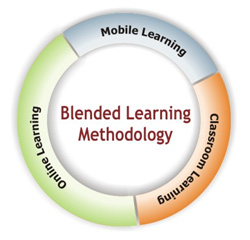
A Perfect Blend for Lifelong Learning
Summer’s already a fading memory. Academic results have been and gone and plans are turning into actions. A lot of people will have been very happy and will have gone to the university of their choice. Congratulations to them and very best wishes for the future. However, things may not be quite so straightforward for a good number of us. One slightly disappointing result and you can be looking at a second choice university or college, clearing or even retakes, after all. But should it always be like this? Is Further Education post exams only available to the immediately successful of us? Can we only find it within the confines of a university or college building? The short answer is no.
We all accept that we live in a time of great change. There was a time when only a few people went to university at all. After A levels they did their first degree, then, having achieved ‘mastery’ in their subject, did a research degree to make an original contribution to it. We’re talking about an elite few, really clever people here. And that was largely the end of it. Well, not any more. To start with, a future in apprenticeships is often seen as a viable alternative to higher education. But what if you want to stay in or near education and get a degree eventually? Now there are several viable alternatives.
Let’s start with Foundation degrees. These provide you with part of a full degree and also represent substantial training. They can be a route to a full degree or a complete qualification in themselves. Still want to get onto a proper degree course? An Access course might be a more attractive proposition than retakes; you’ll make a fresh start and will be taught by concensus and association, like an adult.
So you can do several things: learn through new technologies – like MOOCS ( massive open online courses), or as you do with OOL, where you can pace your learning and go at your own speed, in ways that suit you. It’s sometimes termed ‘blended learning’ (as illustrated above), and you can discover ‘lifelong learning’ in this way: Combining learning for fun with learning for a practical purpose, such as work ambitions.
All of these different types of credit are achievable – just ask the universities; statistics show that 30% of all HE students are now mature ( over 21 or 23 depending on what you read.), whilst these same mature students make up 90% of part time students. Mature students also tend to be very successful. The Open University and Birkbeck College in London are the two universities with the best evidence of this.
With all this in mind, don’t ever be downhearted – it just shows how, increasingly, it’s never too late to learn!
